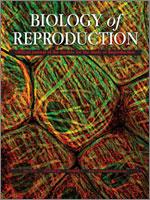Uterine glands and their secretions are required for conceptus (embryo/fetus and associated placenta) survival and development. In most mammals, uterine gland morphogenesis or adenogenesis is a uniquely postnatal event; however, little is known about the mechanisms governing the developmental event. In sheep, progestin treatment of neonatal ewes permanently ablated differentiation of the endometrial glands. Similarly, progesterone (P4) inhibits adenogenesis in neonatal mouse uterus. Thus, P4 can be used as a tool to discover mechanisms regulating endometrial adenogenesis. Female pups were treated with sesame vehicle alone as a control or P4 from Postnatal Day 2 (PD 2) to PD 10, and reproductive tracts were examined on PD 5, 10, or 20. Endometrial glands were fully developed in control mice by PD 20 but not in P4-treated mice. All other uterine cell types appeared normal. Treatment with P4 stimulated proliferation of the stroma but suppressed proliferation of the luminal epithelium. Microarray analysis revealed that expression of genes were reduced (Car2, Fgf7, Fgfr2, Foxa2, Fzd10, Met, Mmp7, Msx1, Msx2, Wnt4, Wnt7a, Wnt16) and increased (Hgf, Ihh, Wnt11) by P4 in the neonatal uterus. These results support the idea that P4 inhibits endometrial adenogenesis in the developing neonatal uterus by altering expression of morphoregulatory genes and consequently disrupting normal patterns of cell proliferation and development.
How to translate text using browser tools
11 January 2012
Progesterone Inhibits Uterine Gland Development in the Neonatal Mouse Uterus
Justyna Filant,
Huaijun Zhou,
Thomas E. Spencer
ACCESS THE FULL ARTICLE

Biology of Reproduction
Vol. 86 • No. 5
May 2012
Vol. 86 • No. 5
May 2012
early development
mechanisms of hormone action
rodents (guinea pigs, mice, rats, voles)
steroid hormone receptors
steroid hormones
uterus




